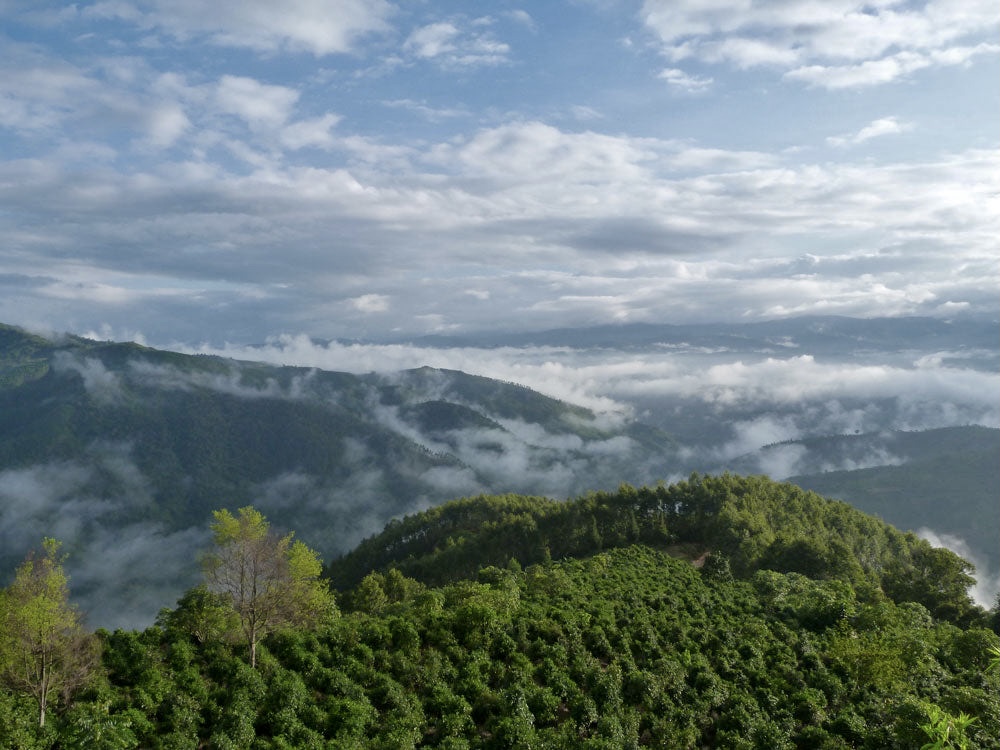
Nestled in the southwestern region of China, Yunnan Province boasts a remarkable landscape dotted with towering peaks, mist-shrouded valleys, and ancient tea trees. Within this captivating province lies an illustrious treasure known as the 6 famous Tea Mountains of Yunnan.
Gedeng 革登
Yibang 倚邦
Mangzhi 莽枝
Manzhuan 蛮砖
Mansa (Yiwu) 曼撒易武
You Le (Jinuo) 攸乐基诺
A Tapestry of History:
Renowned for their rich history, exceptional tea varieties, and breathtaking beauty, these mountains have become a pilgrimage site for tea connoisseurs and adventurers alike.The Tea Mountains of Yunnan have a deep-rooted history that spans centuries. Yunnan is considered the birthplace of tea, and its tea cultivation practices date back over 1,700 years.This region played a significant role in the ancient Tea Horse Road, which facilitated the trade of tea, horses, and other goods between China and Tibet. The tea produced in Yunnan was highly prized, and its reputation as the “Kingdom of Tea” spread far and wide.
Majestic Landscapes:
Yunnan’s Tea Mountains offer a stunning display of natural beauty. As one ventures into these lofty terrains, they are greeted by breathtaking vistas of emerald-green tea plantations, cascading waterfalls, and misty peaks. The mountainous landscape creates the perfect environment for tea cultivation, with its optimal altitude, fertile soil, and abundant rainfall. The terroir differs widely and can be noticed in the taste of the tea from region to region and even on a micro level from village to village or even garden to garden.
Ancient Tea Trees:
One of the most remarkable features of these tea mountains is the presence of ancient tea trees. These ancient tea trees, some of which are believed to be over a thousand years old, are a living testament to the region’s tea heritage. The trees stand tall and majestic, their gnarled trunks and sprawling canopies imparting a sense of wisdom and resilience. The leaves that on some lucky occasions may be harvested from these ancient trees yield exceptional teas. For the most part, Gushu Puerh tea (leaves from ancient trees + 100 years of age) that is accessible on the open market will be up to around 350 years of age.
Tea Varieties:
The Tea Mountains of Yunnan are home to a diverse array of tea varieties. The most famous among them is Pu-erh tea (aka sheng, shou, raw Puerh, ripe Puerh). It is this genre of tea that we at ‘The Tea Guru’ pay most of our attention towards. Other notable teas produced in this region include Dian Hong (Yunnan black tea), Bi Luo Chun (Yunnan green tea), and Jin Xuan (Yunnan oolong tea). Each tea variety showcases the distinctive characteristics of Yunnan’s terroir and the skillful craftsmanship of its tea artisans.
Tea Culture and Tourism:
The Tea Mountains of Yunnan have become a hub for tea enthusiasts, Mao Cha tea buyers and tourists seeking an immersive experience in tea culture. Numerous tea houses and tea gardens offer visitors the opportunity to participate in tea tastings, tea ceremonies, and tea-making workshops. Exploring the mountains on foot or bicycle allows for a deeper connection with nature and an understanding of the tea cultivation process. The tea festivals held in the region further highlight the significance of tea in Yunnan’s cultural fabric.
The Tea Mountains of Yunnan present a fascinating blend of history, natural beauty, and tea excellence. It is a place where tradition meets innovation, where ancient tea trees stand as guardians of a rich heritage, and where the art of tea-making continues to thrive. Whether you are a tea aficionado or an adventure seeker, a journey to the Tea Mountains of Yunnan promises an enchanting experience that will leave you with a profound appreciation for the wonders of tea and the captivating landscapes that nurture it.
Thanks for reading my blog.
Oli
